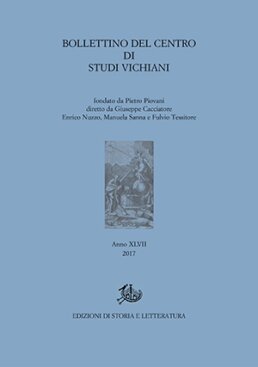Bollettino del Centro di Studi Vichiani Vol. XLVII
FULVIO TESSITORE
AN INTERPRETER OF VICO: GIUSEPPE GIARRIZZO. This essay remembers the figure of Giuseppe Giarrizzo and reflects on his interpretation of Giambattista Vico’s thought. The author focuses on the theme of history and returns to the contribution given by historism to the debate which took place from the 1960s until the 1980s. An historic and historiographical analysis highlights, on the one hand, how Vico, as a political thinker; became relevant in a European context, and shows, on the other, different aspects of the encounter between the ‘New Historist’ schools which have been flourishing in Naples and in Catania.
FABRIZIO LOMONACO
VICO AND EUROPEAN ENLIGHTENMENT ACCORDING TO GIUSEPPE GIARRIZZO. This article reconstructs thè historical and historiographical reasons which motivated Giarrizzo’s studies on Vico. The Sicilian scholar was particularly interested in thè heritage of Late Antiquity and Early Christianity in thè Modem Age, which he investigated in the light of erudition and philosophical history, the decline of Empires and feudalism. All these themes interested directly Vico as well as thè cultural context of Naples, which in Vico’s times was undergoing deep politicai and philosophical transformations.
ALESSANDRO STILE
CORPUS; ANIMUS, MENS: ORIGINS OF (COMMUNITY’ IN VICO’S ORATIONS. This paper focuses on the analysis of some leading words such as ‘corpus’, 1animus cmens and ‘anima’ in Vico’s work} in which a progressive way to the sense of community displays. Body and mind, parted at the beginning, recuperate their relationship in the complexity of social life.
ANDREA SUGGI
THE «MONARCHIE PER NATURA SI GOVERNANO POPOLARMENTE». VICO COMMENTS BODIN. In his Scienza nuova 1744, Giambattista Vico criticizes ]ean Bodin s thesis according to which monarchy has been thè first regime appeared in human history. Bodin, Vico writes, thought that monarchy was founded on violence and that had its model in family, especially in pater familias absolute power. But no monarchy has been possible before reason became ‘dispiegata’ : Vico opposes to Bodin’s arguments a different idea of monarchy – that Vico considered the regime in which, except the king, all citizens are equal – based on his philosophy of history.
GIUSEPPE MORO
STORIES RUNNING IN TIME. FROM CASSIRER TO VICO. This paper is focused on a specific trend in the field of vichian studies. Both Vico and Cassirer, despite their historical distance, are considered as thinkers sharing the same theoretical claim to challenge the supremacy of scientific knowledge in favour of the deeper dimension of mythical thinking. My purpose is to discuss, first, how Cassirer betrays the importance given to the mythical thinking with the primacy of the Function. Second, I argue that, in developing Scienza nuova, Vico elaborates a relationship between facts and principles that is irreducible to the primacy of the logical dimension.
INDEX
- Fulvio Tessitore, Giuseppe Giarrizzo interprete di Vico 7
- Fabrizio Lomonaco, Vico e il Settecento europeo secondo Giuseppe Giarrizzo 27
- Alessandro Stile, Corpus, animus, mensle origini della comunità’ nelle Orazioni vichiane 51
- Andrea Suggi, Le «monarchie per natura si governano popolarmente». Vico interprete di Bodin 87
- Giuseppe Moro, Le storie che corrono in tempo. Da Cassirer a Vico 123
SCHEDE E SPUNTI
- Luca Serianni, Manuela Sanna, Fulvio Tessitore, Note su L’ «Autodidascalo» scrittore. La lingua della Scienza Nuova di Giambattista Vico 163
- Fabrizio Lomonaco, Daniel Canaris, Due Note su un Commentary alla Scienza nuova 177
- Stefano Santasilia, La forza della realtà. Il senso comune nel pensiero vichiano 183
NOTE CRITICHE
- Paolo Cristofolini, Il respiro delle nazioni nel Vico di Alain Pons 199
- Roberto Evangelista, Tra teoresi e realtà Daniel Canaris, L’eredità di Vico 206
- Roberto Evangelista, Piovani e la Scuola napoletana 211
- Francesca Chionna, Le borie e la Hybris 214
AVVISATORE BIBLIOGRAFICO 221
